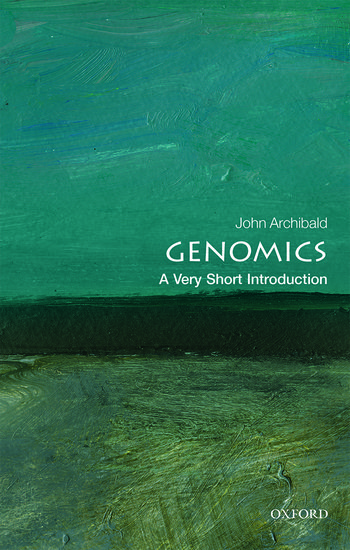Home >
A Very Short Introduction >
Genomics (Science)
A Very Short Introduction | Science
Genomics
ISBN: 9780198786207
Series: A Very Short Introduction
Genomics (Science)
A Very Short Introduction Genomics (Science) Media > Books > Non-Fiction > Education Books Expect Delays of Up to 4 Weeks| Order Below |
ISBN
9780198786207 (10-digit ISBN: 0198786204)
- Description
- Key Features
- Series Description
- Table of Contents
- Explores the science of genomics and its rapidly expanding toolbox, and discusses its impact on epidemiology, medicine, evolution and forensics
- Considers the implications of fast, cheap human genome sequencing for our health and privacy
- Describes how genomics has changed our approach to the biological sciences, and vastly increased our understanding of the natural world
Genomics has transformed the biological sciences. From epidemiology and medicine to evolution and forensics, the ability to determine an organism's complete genetic makeup has changed the way science is done and the questions that can be asked of it. Its most celebrated achievement was the Human Genome Project, a technologically challenging endeavor that took thousands of scientists around the world 13 years and over 3 billion US dollars to complete. In this Very Short Introduction John Archibald explores the science of genomics and its rapidly expanding toolbox. Sequencing a human genome now takes only a few days and costs as little as $1,000. The genomes of simple bacteria and viruses can be sequenced in a matter of hours on a device that fits in the palm of your hand. The resulting sequences can be used to better understand our biology in health and disease and to 'personalize' medicine. Archibald shows how the field of genomics is on the cusp of another quantum leap; the implications for science and society are profound.
Oxford's Very Short Introductions series offers concise and original introductions to a wide range of subjects--from Islam to Sociology, Politics to Classics, Literary Theory to History, and Archaeology to the Bible.
Not simply a textbook of definitions, each volume in this series provides trenchant and provocative--yet always balanced and complete--discussions of the central issues in a given discipline or field. Every Very Short Introduction gives a readable evolution of the subject in question, demonstrating how the subject has developed and how it has influenced society. Eventually, the series will encompass every major academic discipline, offering all students an accessible and abundant reference library.
Whatever the area of study that one deems important or appealing, whatever the topic that fascinates the general reader, the Very Short Introductions series has a handy and affordable guide that will likely prove indispensable.
Please note: As this series is not ELT material, these titles are not subject to discount.
1: What is genomics?
2: How to read the book of life
3: Making sense of genes and genomes
4: The human genome in biology and medicine
5: Evolutionary genomics
6: Genomics and the microbial world
7: The future of genomics
Further Reading
Index
Genomics has transformed the biological sciences. From epidemiology and medicine to evolution and forensics, the ability to determine an organism's complete genetic makeup has changed the way science is done and the questions that can be asked of it. Its most celebrated achievement was the Human Genome Project, a technologically challenging endeavor that took thousands of scientists around the world 13 years and over 3 billion US dollars to complete. In this Very Short Introduction John Archibald explores the science of genomics and its rapidly expanding toolbox. Sequencing a human genome now takes only a few days and costs as little as $1,000. The genomes of simple bacteria and viruses can be sequenced in a matter of hours on a device that fits in the palm of your hand. The resulting sequences can be used to better understand our biology in health and disease and to 'personalize' medicine. Archibald shows how the field of genomics is on the cusp of another quantum leap; the implications for science and society are profound.
Key Features
- Explores the science of genomics and its rapidly expanding toolbox, and discusses its impact on epidemiology, medicine, evolution and forensics
- Considers the implications of fast, cheap human genome sequencing for our health and privacy
- Describes how genomics has changed our approach to the biological sciences, and vastly increased our understanding of the natural world
Series Description
Oxford's Very Short Introductions series offers concise and original introductions to a wide range of subjects--from Islam to Sociology, Politics to Classics, Literary Theory to History, and Archaeology to the Bible.
Not simply a textbook of definitions, each volume in this series provides trenchant and provocative--yet always balanced and complete--discussions of the central issues in a given discipline or field. Every Very Short Introduction gives a readable evolution of the subject in question, demonstrating how the subject has developed and how it has influenced society. Eventually, the series will encompass every major academic discipline, offering all students an accessible and abundant reference library.
Whatever the area of study that one deems important or appealing, whatever the topic that fascinates the general reader, the Very Short Introductions series has a handy and affordable guide that will likely prove indispensable.
Please note: As this series is not ELT material, these titles are not subject to discount.
EASY ORDER FORM
PRICES LISTED INCLUDE CONSUMPTION TAX
Price Before Tax:
¥1,790


